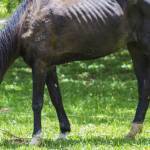Why Isn’t My Horse Gaining Weight?

It seems like your thin horse is constantly eating, but he just doesn’t seem to hold any weight. What might be going on?
There are several major issues to consider when trying to put weight on a thin horse.
Health issues
The first step in trying to change a horse’s body condition is to get a full medical workup to see if there’s a health reason as to why he’s not picking up condition as he should.
Dental problems are commonly cited as a reason for inability to gain or maintain weight. Horses must chew their food thoroughly in order to digest it completely; if their teeth are in poor or neglected shape, they might not be able to chew. A sharp or infected tooth can also cause oral discomfort, making the horse hesitant to eat.
Gastric ulcers can also result in inappetence. A recent study revealed that over 58% of horses across various disciplines had gastric ulcers. Some horses that are ill for other reasons or stressed will eat better when treated with drugs that reduce stomach acid, even though they do not actually have ulcers.
When high concentrations of fructans are found in pasture grasses or when large grain meals are fed, horses digest these highly fermentable sugars in the hindgut. A condition known as subclinical acidosis can result in decreased feed intake, mild to moderate colic of unknown origin, poor feed efficiency with weight loss, poor attitude, loss of performance, and development of vices such as cribbing and wood-chewing. A hindgut buffer, such as EquiShure, helps neutralize gut conditions by preventing the drastic drop in pH associated with high lactate production.
Internal parasites will compete with the horse for nutrients inside the digestive system, while also reducing the horse’s ability to absorb the remaining available nutrients. Horse owners might ask their veterinarian to perform fecal egg per gram (EPG) counts on horses in poor condition to assess parasite burdens, as well as assist in tailoring a deworming program that is best for the individual farm. Doing EPG counts rather than blanket deworming all the animals on the farm can also help slow the development of resistance to dewormers, and less frequent deworming reduces costs.
Appropriate feed—quality and quantity
All equine diets should be based on high-quality forage. Forage is the best way to support healthy digestion, especially if the horse is recovering from issues such as gastric ulcers or acidosis. Legume forages (lucerne or clover) are higher in protein and calories than grass forages, so consider these in your forage offerings.
A poor-quality forage or feed can house mycotoxins, dust, or mould—all of which can lead to health issues that could cause the animal to lose additional weight. Poor-quality feed and forage will also have lower levels of nutrients, which can easily result in deficiencies, especially if the horse is a picky eater.
Horse owners struggling to put weight on a thin horse should verify that they’re using an appropriate feed for the class of animal—for example, a general horse and pony pellet isn’t formulated for performance horses or broodmares, so even if you feed the amounts directed, the calories, protein, and nutrients supplied will still be insufficient. A deficiency in just one nutrient or amino acid can be enough to cause a horse to lose weight or prevent a horse from gaining weight.
A few special ingredients can boost a typical ration into high gear. This includes the addition of:
- Fats and oils, which have significantly higher calories than other feedstuffs;
- Super fibers, which are fermented in the hindgut and contain a similar amount of calories as grains;
- Yeast cultures, which support digestion, ensuring your horse gets the most out of his feed;
- Treats and flavoring agents, such as molasses or honey, to increase appetite in picky eaters.
Environment and herd dynamics
If the horse is given a clean bill of health and his diet is spot-on, next look at environmental factors that might be causing stress and reducing weight.
Make sure a hard-keeper can eat in peace, away from aggressive pasturemates. Keep the animal calm and relaxed to encourage him to eat. Provide a companion for an anxious animal.
Conclusion
Clearly there is a lot to consider when your horse won’t gain weight. By working through all these steps, you can hopefully get to the bottom of the problem. Kentucky Equine Research’s team of equine nutritionists and advisors offers dietary analyses and consultation to horse owners and veterinarians. Contact KER for insight into your horse’s feeding program








